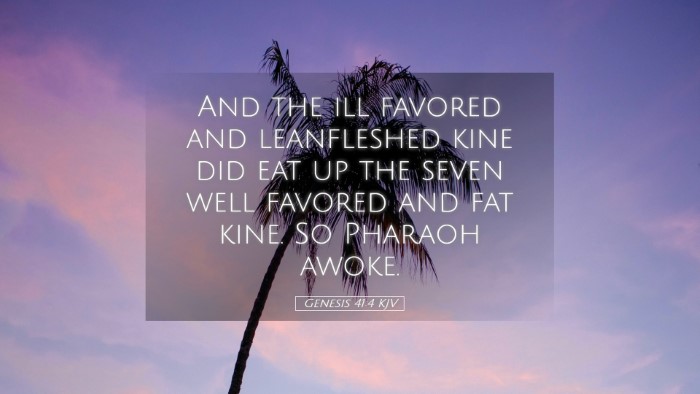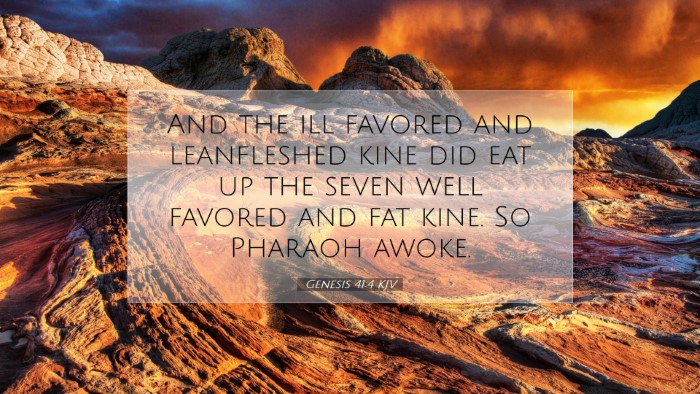Bible Commentary on Genesis 41:4
Verse Context: Genesis 41:4 states, "And the cattle were ugly and gaunt, and did eat up the seven well-favoured and fat cattle." This verse follows the narrative of Pharaoh's dreams, which are pivotal in Joseph’s rise to prominence in Egypt. Pharaoh's dreams symbolize future events and carry profound implications regarding God's sovereignty and the unfolding of human history.
Overview of the Passage
This verse describes a crucial part of Pharaoh's dream—a dream that would set into motion events leading to significant national and international consequences. The imagery of the cattle serves as a vivid metaphor for abundance and scarcity, prosperity and famine. The interpretation of Pharaoh’s dream, facilitated by Joseph, reflects the divine revelation of future events and the necessity of wisdom in managing resources.
Thematic Insights
- Divine Sovereignty: Both Matthew Henry and Albert Barnes emphasize that God governs the affairs of nations. The dreams reveal not just the fate of Egypt but serve as a reminder that God oversees the coming years of plenty and subsequent famine. This serves as a cautionary message about reliance on earthly bounty.
- Preparation for Famine: Adam Clarke notes the urgency embedded in Pharaoh’s dreams. The gaunt cattle consuming the fat cattle symbolize that trials can swiftly overshadow times of prosperity. It underscores the need for prudent planning and preparation in times of abundance to weather future adversities.
- Contrast Between Abundance and Scarcity: The striking contrast introduced in this verse accentuates the dual nature of life—the cycles of prosperity and need, which is a recurring theme throughout the Scriptures. It's a reminder to believers to remain humble and dependent on God in seasons of both plenty and lack.
Commentary Insights
Matthew Henry comments on the stark realities illustrated in the dreams. He observes that the "ugly and gaunt" cattle are a metaphor for dire circumstance and impending doom. This vivid imagery is meant to evoke a sense of urgency and calls for discernment among the leaders and people of Egypt during times of prosperity. Henry emphasizes that human arrogance during prosperous times often leads to pitfalls that are forewarned by adversity.
Albert Barnes highlights the implications of the dream's interpretation and its social justice aspects. The dreams indicate a forthcoming famine that requires intervention and moral responsibility from the leaders. Barnes urges readers to reflect on the ethical implications of wealth accumulation and resource management during times of plenty to prevent societal collapse.
Adam Clarke adds an analytical view concerning the psychological aspects of Pharaoh’s dreams. He stresses how the king's distress over the dreams showcases the innate human response to fear and uncertainty when faced with crises, and it's Joseph’s role to provide comfort through divinely-inspired wisdom. Clarke believes that Joseph’s interpretation is a testament to divine purpose working through human agents, showcasing providence within the chaos.
Application for Believers
- Awareness of Cycles: Understanding that life entails both mountain-top and valley experiences can help believers prepare spiritually and pragmatically for life's uncertainties. Christians are to live in the knowledge of God’s ultimate plan, remaining vigilant and wise in stewardship.
- Encouragement to Lead with Integrity: As leaders, whether in the church or in society, the call is to act with foresight regarding the well-being of those under one's influence, inspired by the example set by Joseph.
- Faith in God’s Provision: In times of adversity, believers are encouraged to trust in God’s providence. Just as God provided through Joseph, so too does He provide through the circumstances of life, even when facing daunting challenges.
Conclusion
Genesis 41:4 serves as a pivotal reflection on God's sovereignty over human affairs and the profound importance of wisdom in times of abundance. The imagery of cattle highlights the inevitability of change, urging both leaders and followers to acknowledge divine sovereignty and to act with prudence and faithfulness in stewarding God's resources. As such, this verse is a rich text for both theological reflection and practical application, relevant for pastors, students, and scholars alike.


